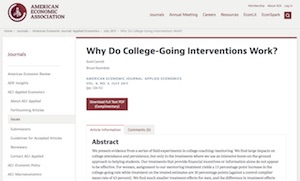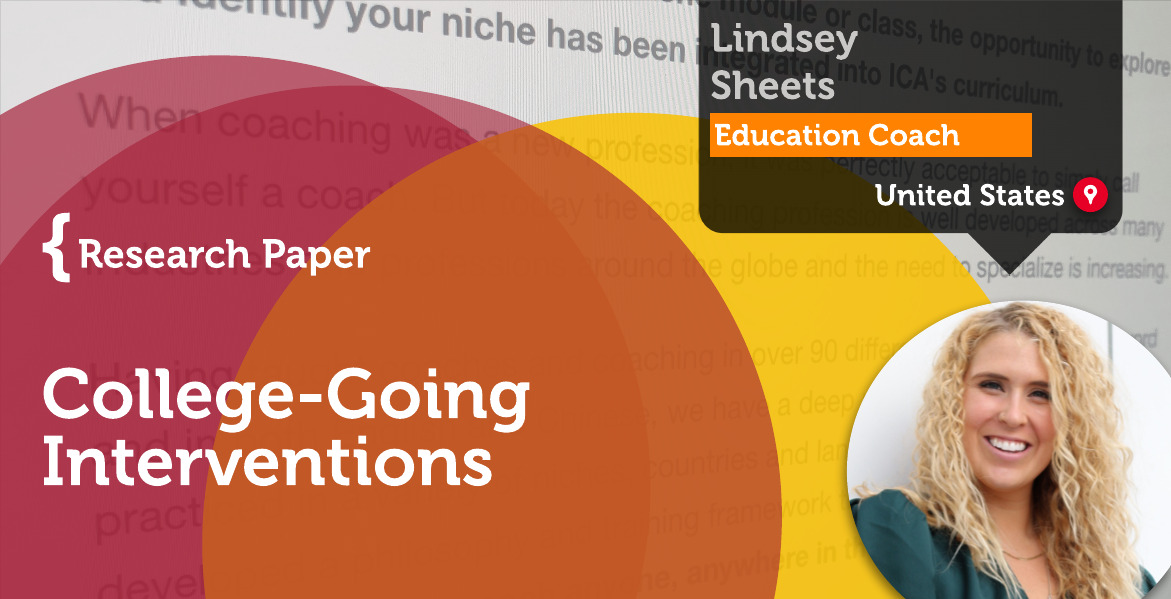A Research Paper By Lindsey Sheets, Education Coach, UNITED STATES
For this research paper, I decided to interview Bruce Sacerdote, an economist from Dartmouth. His paper, written with Scott Carrell, is titled Why Do College-Going Interventions Work? and focuses on “college-going interventions.”
Though this isn’t what I call it, this is essentially what my coaching is as a Student  Empowerment Coach. Their research worked with students in their senior year of high school in one of 20 New Hampshire high schools to provide what they called ‘college-going interventions.’ These interventions consisted of working with students on the verge of applying or not applying to college. These students were broken into two groups, each group receiving different treatment. These interventions were intended to help students that “might be in danger of falling through the cracks. We’re going to help them, make sure they get to college.” As Bruce put it.
Empowerment Coach. Their research worked with students in their senior year of high school in one of 20 New Hampshire high schools to provide what they called ‘college-going interventions.’ These interventions consisted of working with students on the verge of applying or not applying to college. These students were broken into two groups, each group receiving different treatment. These interventions were intended to help students that “might be in danger of falling through the cracks. We’re going to help them, make sure they get to college.” As Bruce put it.
My coaching is built to serve the same purpose. My goal as a coach is to work with students of all ages to determine their next steps and move in the best direction for them. I will be working with kids in high school to decide if college is the correct next step and what kind and where to go and for how many years. I also work with older ‘students’ determining if going back to school is their best bet or maybe they are deciding on switching careers or trying for the promotion.
My coaching is for everyone trying to make moves in their careers and educational pathways. My coaching is designed to serve as my clients’ “college-going intervention” to step in and give them the support (and sometimes challenge) that they need to make their next move.
In this paper, you will find a few of my questions and Bruce’s responses that demonstrate how these interventions worked for these kids and why. You will see the connection between direct one-on-one attention for the student or client and their success. To see the full transcribed interview or to listen to the recording, please visit my website.
Interview With Bruce Sacerdote on College-Going Interventions
Lindsey: my first question is, do you just want to tell me a little bit about your background? You said you’re an economist and I know you’re– right now you’re at Dartmouth, but do you want to tell me a little bit about who you are and what your background is? We could start there.
Bruce: Yeah, so I am an economist. I went to Dartmouth as an undergrad and worked at BCG. I worked in [inaudible] consulting. I’ve done a bunch of business things. I went back to Harvard and got my Ph.D. in Economics. And, I really enjoyed that. (GAP) And that’s kind of, in a nutshell, how I got into this end of the business. And, I have always been interested in youth outcomes and the college [flowing into?] the outcome. college [inaudible], college graduation and earnings for young adults and the outcome. So, this was a natural– for Scott Carroll and me, this was a natural direction to go.
Lindsey: …why did you decide to focus on this area of study specifically? Was it just because of your area of interest or was there just kind of a gap in the knowledge?
Bruce: …And so we thought, “Hey, maybe there’s a quick intervention at just the right time would have– could be really impactful,” which, of course, is true, right? I mean, it’s just– common sense tells you that there’s probably going to be some interventions that can be really helpful if they come at the right moment. (GAP) And so, we set out to design what we thought would be nice with that sort of college-going, college graduation in school. Well, we’re going to find high school students who looked like they might be in danger of falling through the cracks. We’re going to help them, make sure they get to college. That was the whole thing.
Lindsey: What would you say– when working with these students, was the major takeaway for your team about the interventions? And how they impacted the students?
Bruce: You know, I would say that the– specific [inaudible] but the– just that support is so important. That first-line support. (GAP) You just need an adult, or [inaudible] older adult. There is nothing that’s going to guide them through something [inaudible]. It’s already a little bit intimidating, and maybe they’re not used to filling out all these forms and navigating an [inaudible] of websites.
So, I require some persistence, right? And, having that helping hand, that was really the takeaway, more than like, “Oh, there’s some magic formula that we have.” Like, we know what college ratings are, do we just give them the magic number?” (GAP) It’s just some sort of guiding and adventuring. And, encouraging. More than anything magical in one single piece of education, you know?”
Lindsey: Yeah. And I actually love that you say that because that’s something that I’ve been trying to– articulate to people the importance of this extra step of coaching, for kids at this age. Because so many parents can’t or won’t– or are not able to give their kids that extra attention and support. So, if they have someone, they can kind of– hire out, or could give their students over to for a couple of hours a week, to be supported in that manner, that positive impact.
Bruce: Yeah. Totally. I mean, it’s [inaudible], right? So, I can kind of– in some ways, so it makes it a little bit harder to publish these studies, because people are like, “Oh yeah, that’s common sense.” But, on the other hand, it’s very rewarding to do those, because it’s nice to see or [inaudible] make a difference in someone’s life, you know?
Lindsey: Yeah. Yeah, and I would– I guess I agree to an extent, this idea of its common sense, but is it? I mean, if it was that common sense, we would have somebody in every high school that their only job was to give them that support and that attention, you know?
Bruce: Right, yeah. That’s true, that’s true.
Yeah. I, agree, it’s true. And one thing that we’ve found for certain [inaudible] about the educational system is that in both [inaudible] colleges can see that the more support that colleges provide in, you know [inaudible] the more students graduate from that college, and so there’s a direct correlation between the colleges that are putting the students first and– for students at the graduation, right?–regardless of how [honestly?], the kids coming in are highly selected. Nonetheless, the reason behind Dartmouth’s 98% graduation rate is that the support is just overwhelming. Regardless of if you’re having a problem, folks are tracking you down and helping you, so.
Lindsey: Yeah, that’s really nice. Almost feels more personal. You’re not just a number. You know you have that ability to find support when it’s needed.
Bruce: Yeah. That’s right. And in a way– because Michigan is very selective, but I’m kind of guessing that Michigan, being a much bigger school, doesn’t have that level of, okay, we’re going to track you down and call your cell phone and find you and talk to your folks and help you if you’re off track. So that’s my guess, comparing it to a big selected place like [inaudible] or Michigan, as opposed to a small, very expensive, selected place like a Dartmouth.
After talking with Bruce, it was clear that what students really needed to be successful was time, attention, and support. This study showed, clearly, that the people involved in the study that got the hands-on, one-on-one support were more likely to complete the tasks and, therefore, go to the school of their choice.
My coaching is designed to give students exactly that one-on-one support to get them to their next steps, feeling prepared and ready to start their next life stage. With coaching that is designed to be personalized and unique to the student and their needs, I strongly feel that any student can be successful in transitioning from high school to their next steps. Whether that next step is college, for any length of time, the military, a trade school, or even a gap year.
References
Interview with Bruce Sacerdote by Lindsey Sheets
The Paper was written by Bruce Sacerdote and Scott Carrell
